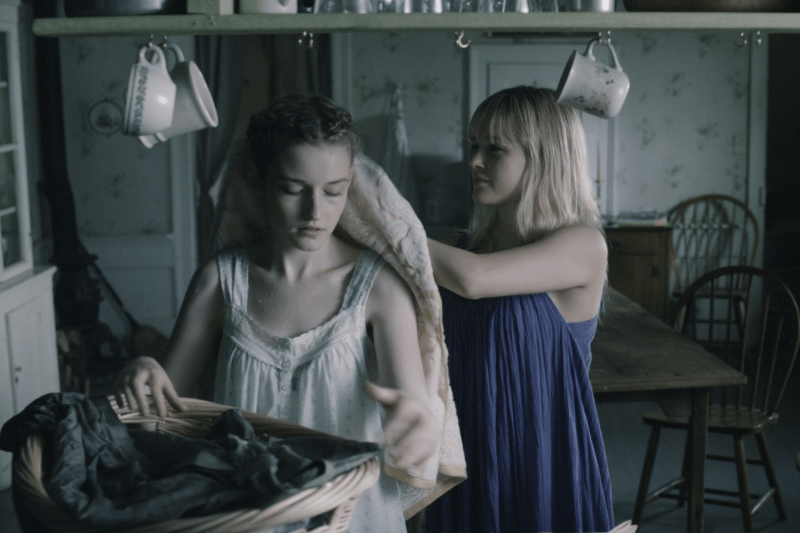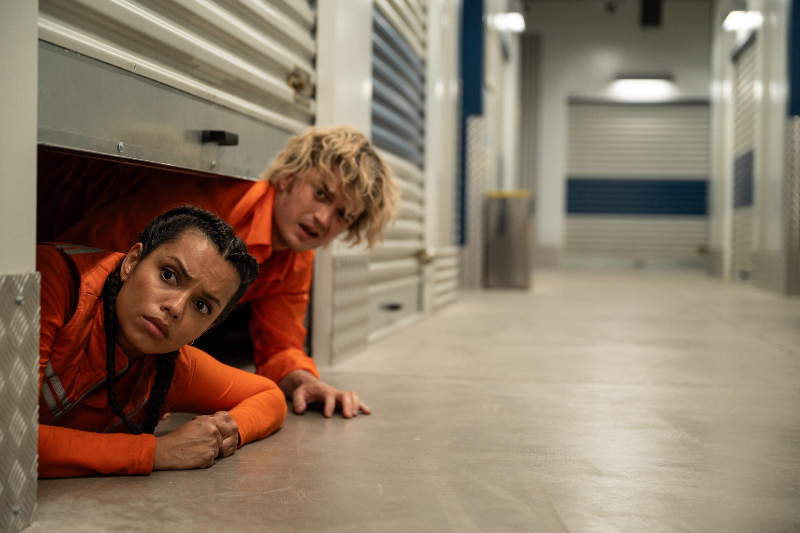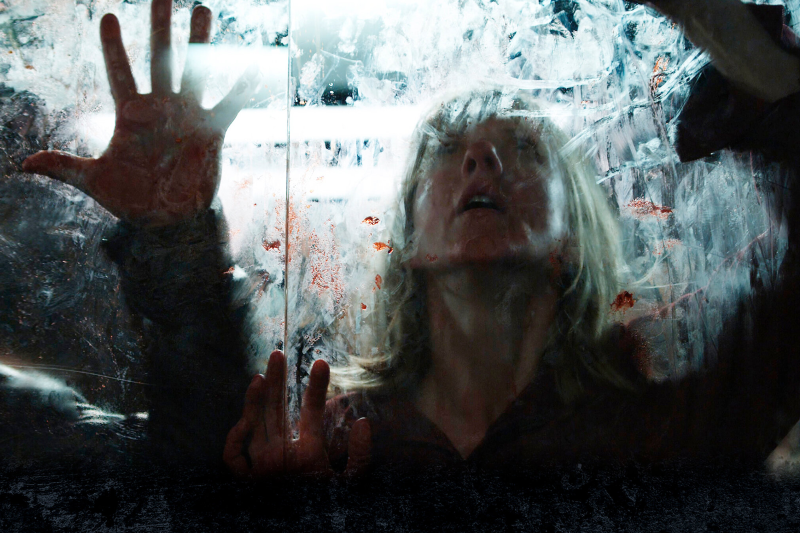November is often considered a time for family, traditional meals, and being thankful for what you have in life. What better way to celebrate this than with a Uterus Horror film featuring a family of cannibals? That film is 2013’s We Are What We Are. It has everything audiences could want: an unraveling family with a dark secret, a yearly ritualistic feast with the other-other white meat, and the coming-of-age story of two sisters trying to break free of their generational trauma.
We Are What We Are is a remake of the 2010 Mexican film of the same name, but while that version followed two brothers, this one follows a pair of sisters. Based on the screenplay by Jorge Michel Grau, this version of the story was written by Nick Damici (Stake Land) and Jim Mickle (Sweet Tooth), with the latter also directing the film. We Are What We Are tells the story of the Parkers, a deeply religious family of five living in a small town. On the first day of their yearly ritualistic fast, before a particularly special meal, the mother has a mysterious medical episode that leads to her untimely death. This event, as well as days of heavy rains flooding the area, threaten to expose a centuries-long family secret.
The living members of the family are Iris (Ambyr Childers), Rose (Julia Garner), Rory (Jack Gore), and their father, Frank (Bill Sage). It's not entirely clear how old Iris is, but we know she is out of high school, while Rose is 14 years old, and Rory is just a little boy. Although Frank is the patriarch of the family, it seems most of the responsibilities had fallen to his wife. With her gone, those responsibilities go to Iris as she’s the eldest daughter. This first becomes evident when Iris and Rose are forced to go identify their mother’s body. They go together, but Doc Barrow (Michael Parks) states he only needs one person to take on the task. Iris volunteers to shield her younger sister from having to see their mother in death.
Following their mother’s passing, Iris and Rose debate whether they should continue their family’s annual tradition. Rose even consults her father, but it’s clear there’s no swaying him. After their mother’s funeral, Frank gives Iris a journal dating back to 1781. This journal belonged to an ancestor of theirs who first settled in the area. In the journal, a young girl recounts the hardships her family had endured when first arriving, unable to find suitable food to survive. The father and uncle leave to find food, but only the father returns with fresh meat in hand.
The girl’s mother dies of starvation and exposure, leaving the girl with her younger brother and religious father. As the father begins to lose his mind, it becomes clear to the girl that her family’s survival is now her burden. When she discovers her father has their mother’s body in the back of a cave, already partly butchered, he hands his daughter the knife to continue the work, which she readily accepts. This event becomes known in the Parker family as “Lambs Day” and is the beginning of their yearly fast, followed by the consumption of human flesh.
Even though the audience only sees the Parker family dynamics over the course of a few days, it establishes the various roles they all play. We Are What We Are makes it clear that Frank is in charge. He is the head of the household, and whatever he says goes. This likely stems from upholding the tradition begun by their ancestors in the 1700s, as well as the links between the Parker traditions and their deep-seated religious beliefs. Frank wouldn’t let his wife see a doctor for her headaches, nor would he let his sick son see a doctor. He is also the one who decides to keep the Parker rituals alive. But despite all this, Frank is never seen doing any actual work. In addition to forcing his daughters to identify their mother’s body, he also forces them to murder an innocent woman and butcher her for their ritualistic feast.
This dynamic has clearly been in place since the first Parker family settled in 1781, but Iris and Rose want better for themselves and their little brother. Rose is certainly more vocal about her desire to stop killing and consuming innocent people, but Iris does not necessarily feel the same way. Iris is simply doing her best to hold the family together and help them survive, just as her ancestors did. It isn’t until Iris and Rose have to kill for the first time that Iris sees they cannot continue as they had. While all of this is happening with the family, Doc Barrow begins investigating human bones unearthed by the flood waters. Even though the sheriff is uninterested, Barrow enlists the help of the new deputy, Anders (Wyatt Russell), who happens to be Iris’ old flame. As Anders gets close to the truth, Iris at first attempts to convince him nothing is going on, and the two begin to have sex, but it’s cut short when Frank shows up and kills Anders. He calls his daughter filth before sending her home so he can dispose of the body.
Knowing the family secret is coming out, Frank decides to put arsenic in the family dinner to kill himself and his children. His plans are temporarily thwarted when Rose discovers his intentions, and Barrow shows up to confront Frank. A fight ensues, but ultimately Frank incapacitates Barrow and wrangles his children back to the dinner table to die. Yet Rose and Iris have a much stronger will to live. They attack their father, biting into him and devouring him alive. Finally free of Frank’s tyranny, Iris, Rose, and Rory pack up and leave to start a fresh life.
The Uterus Horror journey throughout We Are What We Are brings up interesting perspectives on generational trauma, religion, and even the more animalistic side of human nature. While they are different ages and at different stages of development, Iris and Rose go on this journey together. The responsibility transfers from their mother to Iris, but Rose is there with her sister every step of the way. Both young women take on the role of mother in the household. They cook, clean, raise Rory, and of course, must butcher innocent people.
Having their mother around to protect them sheltered the daughters from the trauma, but with their mother gone, Iris and Rose come face-to-face with the harsh reality of what their family is. They are old enough and smart enough to understand that tradition is wrong. They want more for themselves and their little brother. For the original Parker family, consuming human flesh was a matter of survival. Over the generations, it was bastardized and turned into a yearly ritual directly connected to the family’s deep Christian faith. By going through with this ritual, they believe “all sins are forgiven in the eyes of the lord.” To Iris and Rose, it is a curse rather than a blessing.
Frank’s final moments are an important part of Iris and Rose’s growth. An animal — human or otherwise — will go to great lengths to survive. That’s how the whole tradition started, with a family on the brink of death trying to live through a harsh and unforgiving winter. Eating humans no longer makes any sense because it’s not needed for survival. That is until Rose and Iris eat Frank. Their father was the greatest threat to the family’s survival. If they did nothing, Iris, Rose, and Rory would have died alongside him. Attacking and eating Frank was like the desperate act of a wild animal, killing the predator before they became the prey. In a way, it gives Frank what he wanted: for the family to continue their deranged tradition. Without him, Iris and Rose can escape to live the life they choose and raise their younger brother free of religious oppression and trauma.
We Are What We Are is a haunting piece of Uterus Horror. It depicts two young women on the same journey, although at slightly different times in their development. Their transformation is entirely internal as they end the vicious cycle that has gone on for generations, throwing away everything they have ever known to find a better way of life. This is different from the Uterus Horror films previously examined, most of which depict the person on their journey as being completely alienated from everyone they love. If Iris and Rose didn’t have each other, their story could have ended up quite differently. Together, they break their cycle of horror, something no one in their family had the strength to do in over 200 years.






